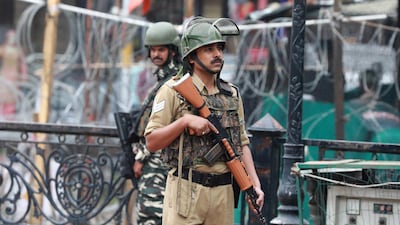A precise date is yet to be set for the swearing-in of Pakistan’s newly elected prime minister but the symbolic significance of the event is apparent anyway. Imran Khan will take his oath as Pakistan’s 21st prime minister either on, or close to, his country's 71st birthday next week, inextricably intertwined with the painful anniversary of Partition. This year's anniversary will no doubt be described as a new beginning for Pakistan.
Perhaps. It might not fulfil the glorious expectations or passionate hopes for wholesome change but nothing quite like this has happened before, not just in Pakistan but on the subcontinent as a whole.
Mr Khan, a bit like France’s president Emmanuel Macron, won his election with a party he founded himself relatively recently. He didn't inherit his status from his family nor did he get it by loyal service in a long-established political outfit.
The comparison is not exact, of course. Mr Macron accomplished the seemingly impossible – defeating France’s socialist and centre-right parties – in a matter of months, not the two decades it has taken Mr Khan to lead his Pakistan Tehreek-i-Insaf (PTI) to victory. Even so, Mr Khan, like Mr Macron, might justifiably be called a start-up leader.
But is he an entrepreneur for peace? Mr Khan is undoubtedly a new sort of South Asian leader – a high-functioning achiever from a sport that is very different from politics. But so far, it's unclear whether he will invest anything other than rhetoric in initiatives for peace with neighbouring India.
So goes the dirge from India, where mostly there seem to be few expectations of Prime Minister-elect Khan’s good neighbourliness and benign intentions. Consider this gloomy pronouncement from former Indian foreign secretary Kanwal Sibal: “Imran Khan’s victory not only holds no hope of improved understanding but will also make the handling of bilateral ties more difficult.”
It is not just the Indian foreign policy establishment that is wary. The favour he reportedly enjoys with Pakistan's powerful army and his austere public embrace of a religious idiom have made the man Indian cricket fans familiarly call "Imran" somewhat suspect.
And Indians, just as much as everyone else, have noted Mr Khan’s ranking of the countries and regions he considers important to Pakistan in his first speech after winning the election. India came in seventh, a dismissive – some might say almost contemptuous – placement for a giant, nuclear-armed neighbour with which Pakistan has a live territorial dispute.
All of this is dispiriting, especially because Mr Khan's incipient stewardship of his country could be a game-changer for South Asia. To understand why, consider the state of affairs in the region. Both India and Bangladesh are Pakistan's blood brothers and political and economic developments in all three countries should be roughly in tandem. But they're not.
Although Bangladesh is the youngest and smallest of the three, it has become an unlikely success story – at least in terms of socially progressive policies. From 2006, its GDP growth has been higher than Pakistan’s and its population growth lower. It also has the highest life expectancy and lowest child malnutrition of the three. Additionally, it has pioneered poverty cures that have the world paying admiring attention – microfinance in the late 1970s, hands-on training for poor women and cash for managed migration to cities this century.
But in its politics, Bangladesh offers no bold new template, just the ossification of control by two political dynasties that take turns in power. Its general election, due before December 31, is likely to have the same tired themes with the additional frisson of the threat posed by orthodox groups. There will be the battle of the begums – prime minister Sheikh Hasina and her jailed predecessor, Khaleda Zia. And there are the usual allegations of judicial interference by the government of the day and intimidation of the opposition.
As for India, its economic growth and diplomatic clout has been an ongoing news story for 25 years – not just for what has been achieved but for all that has not. India’s politics, however, is polarised and polarising. There are the now-establishment insurgents – Narendra Modi’s governing Hindu nationalist Bharatiya Janata Party – and there is the dynastically led Congress and multiple regionally important parties. But Hindu fundamentalist groups, which discriminate against minorities and women, are trying to thwart scientific research, higher education and India’s inclusive brand identity.
One might have thought that regional strengths and weaknesses would be of interest to an unusual start-up leader such as Mr Khan. But even before he takes office, he has made clear he finds no South Asian role models and only China is the exemplar.
In fact, in that first address to the country and the world, Mr Khan spoke of India solely in the context of Kashmir and left out Bangladesh altogether. This is a missed opportunity, especially for a politician who sees himself as Pakistan’s man of destiny.


